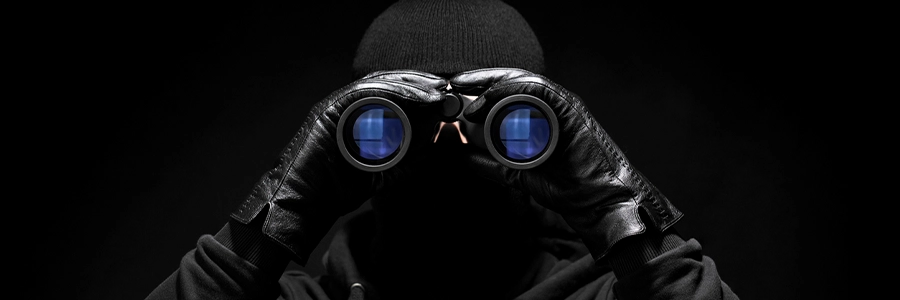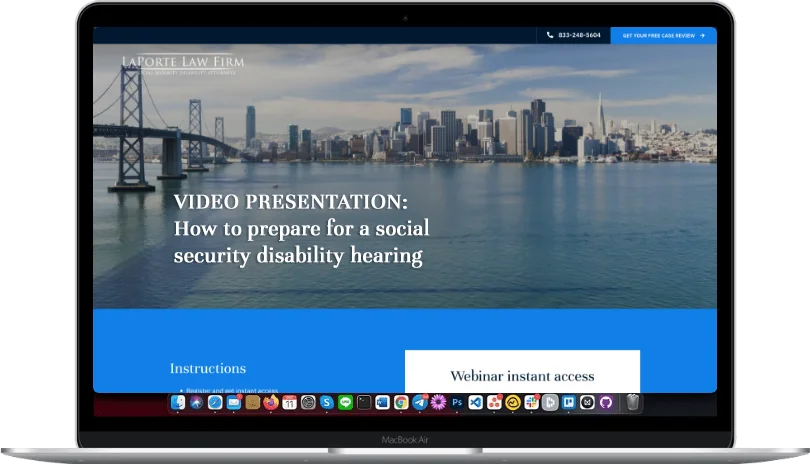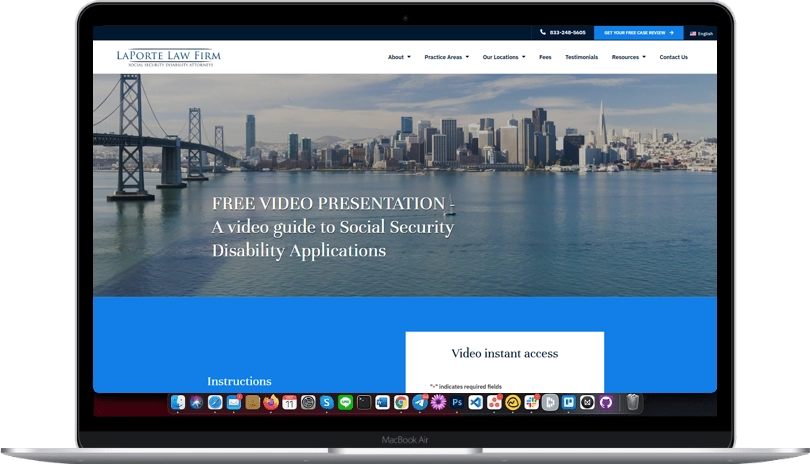
Applying for Social Security disability benefits involves divulging sensitive personal, medical, and employment information. In today’s hyperconnected world, a common anxiety adds another layer of stress: “Is the Social Security Administration (SSA) watching my social media?” An investigation into social media posts conjures images of investigators combing through your personal history of online posts, including photos of family vacations, looking for any reason to deny a legitimate claim.
This article will cut through the myths about the use of social media to provide a clear, factual understanding of the SSA’s approach to social media, empowering you with the knowledge to protect your disability claim.
Dispelling Myths and Understanding Realities
For anyone pursuing a disability claim, the stakes are incredibly high. You’re providing detailed medical records and personal testimony about your limitations. The thought that a misunderstood photo or an out-of-context post could jeopardize the financial support you need is a valid concern. By learning what the SSA actually pays attention to online, you can take simple, proactive steps to ensure your digital footprint reflects your situation accurately and doesn’t unintentionally complicate your claim.
Setting the record straight: What “monitoring” really means for disability claimants
Social Security regulations state that administrative law judges (ALJs) and adjudicators “must not” use internet sites and social media profiles when evaluating disability cases. However, there is an important exception to this rule. In rare cases where there is a report from a CDI (Cooperative Disability Investigative) unit in a claimant’s file that corroborates information posted to publicly available social media sites, then the adjudicator may consider this information as part of the disability determination process.
In addition, an ALJ or adjudicator may consider evidence from social media when it has been submitted by a claimant or a claimant’s attorney representative.
Understanding the scope: The SSA is not spying on you
The SSA processes millions of disability claims each year. The agency simply does not have the resources, nor the mandate, to conduct constant social media surveillance on every single applicant. Investigations are reserved for cases that raise red flags regarding fraud. Only a small fraction of claims for Social Security disability are investigated, and only in those specific instances can an adjudicator use your public social media to make a decision about your disability claim.
The primary form of evidence in disability cases is your medical record, not posts made to social media. Medical documentation reflects your diagnoses, functional limitations, treatment history, and the opinions of qualified providers — all of which carry far more weight than a single photo or status update.
By contrast, social media posts can be deceiving. They are simply snapshots of a person’s life, and do not, in and of themselves, demonstrate a person’s ability to perform full-time substantial gainful activity. Further, an individual does not need to be completely bedridden in order to qualify for disability. Disability beneficiaries can lead normal lives, travel, post on social media, and still be technically eligible for disability benefits.
The Office of the Inspector General (OIG) and other investigative branches
The SSA’s Office of the Inspector General has broad authority to investigate all allegations of fraud, waste, and abuse within SSA programs. While the OIG’s scope is wider, their investigations can certainly include reviewing a claimant’s online activity if a fraud allegation has been made. These are not routine checks; rather, they are formal investigations triggered by specific information that suggests wrongdoing.
When and why social media monitoring might occur
Monitoring is not a standard part of the Social Security disability process at the application, reconsideration, or hearing stage. CDI units become involved only when a fraud referral is made, whether during an initial claim, a reconsideration, or a Continuing Disability Review.
When a CDI investigation is opened, the process may include surveillance, a review of publicly available social media accounts, and occasionally a home interview. Once the report is complete, the CDI unit will submit a detailed report of their findings to the Disability Determination Services (DDS) to be incorporated into a claimant’s disability file.
If the report contains information about a claimant’s social media posts, then the adjudicator or ALJ may consider this evidence as part of the overall five-step sequential evaluation that applies to all disability claims. Otherwise, the adjudicators do not review social media posts during the analysis.
Contradictions to your claimed medical condition and functional limitations
This is the primary target of any review. If you state in your application for SSDI benefits that you cannot lift more than 10 pounds, stand for more than 15 minutes, or engage in complex social interactions, an investigator will look for evidence to the contrary. Photos or videos of you lifting heavy objects, participating in a 5K race, or engaging in extensive physical hobbies can directly undermine the medical evidence in your file. It’s the inconsistency between the claimed limitation and the observed activity that creates a problem.
Inconsistencies with reported daily activities and medical treatment regimens
When a CDI investigative unit conducts a review of social media accounts, they are searching for evidence of fraud. For example, if a person claims to be disabled due to blindness, yet their social media contains videos of them driving a vehicle on public roads, this is evidence of fraud. However, the information must be corroborated by CDI, so if the driving video is AI generated, then this evidence does not corroborate the fraud allegation.
Proactive Social Media Management: Protecting Your Disability Claim
For the vast majority of disability applicants, the Social Security Administration focuses primarily on medical evidence when making disability determinations. A targeted investigation that may include social media review is rare and typically only occurs when specific red flags are raised.
The importance of objective medical evidence
The cornerstone of any successful Social Security Disability claim is objective medical evidence. This includes clinical findings, diagnostic imaging like MRIs and X-rays, lab results, and detailed treatment notes from your doctors. This type of evidence provides a longitudinal record of your condition and its severity. It is this medical evidence, not your Facebook profile, that serves as the primary basis for the SSA’s decision.
Misinterpretation and context: Why social media can be misleading
Everyone knows that social media is often a “highlight reel.” People post their best moments, not the days they spend in bed unable to move. A single photo of you at a wedding does not negate a diagnosis of severe degenerative disc disease. This context is critical.
In the rare case that social media posts become relevant to a claim for disability, an experienced disability attorney can argue that such photos are not representative of your day-to-day functional capacity and should be given minimal weight compared to documented medical evidence.
What to Do If Your Social Media Activity Is Questioned
If you discover that your social media activity has been introduced as evidence in your disability claim as part of a CDI report, do not panic. In some cases, the CDI report will conclude that the “fraud” allegation is not based on any evidence. Attorneys at LaPorte Law Firm have only seen CDI reports in a small handful of thousands of cases, and the CDI reports that were reviewed all concluded that no fraudulent activity was detected.
The critical role of a disability attorney
This is a scenario where a qualified disability attorney becomes indispensable. An attorney can review the SSA’s evidence, including a CDI report, and file written briefs with arguments about how the overall medical record demonstrates disability. They can help provide context for misleading photos or videos, for example, by submitting a statement from you or a witness explaining the circumstances. They will also reinforce the primacy of your medical records and advocate on your behalf to ensure the judge gives the social media evidence its proper, limited weight.
Empowerment Through Information and Diligence
Navigating the Social Security disability system is challenging, and the fear of being watched online only adds to the burden. By understanding the truth about the limited instances of social media monitoring, you can replace anxiety with informed action. The SSA is not watching everyone, but for the integrity of the benefits program, it does investigate claims that present credible red flags. Your public digital life is one potential source of information in such an investigation.
If you’re unsure how your online activity might affect your case — or if you simply want guidance you can trust — LaPorte Law Firm is here to help. Our experienced disability attorneys can review your situation, explain what actually matters to the SSA, and guide you through every step of the process. Reach out today for a free consultation and get the clarity and confidence you need to move forward.
FAQs
Not directly or routinely, but they can review your public social media posts if the CDI initiated an independent investigation of fraud.
Posts showing activities that contradict your stated limitations (e.g., travel, sports, heavy lifting) can hurt your credibility when they are reviewed during a CDI investigation.
Yes, the SSA can legally use publicly available information as part of their CDI investigation. This report goes to adjudicators at the DDS or ALJ level and can be factored into your disability claim.















